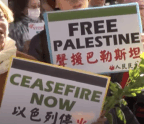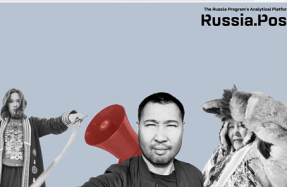Filipino academics and civil society groups express support for Palestinian cause
Originally published on Global Voices
The Israeli government’s war on Gaza has sparked vigorous expressions of support for the Palestinian cause from a diverse group of Filipino Muslims, young netizens, academics, activists, and civil society groups in the Philippines. The Israeli retaliation to the October 7 surprise offensive led by the Palestinian Islamic Resistance Movement (Hamas) against Israeli military bases and garrisoned communities along the borders of the Gaza Strip has been called by a former top UN official “a textbook case of genocide.”
Israeli military forces have carried out relentless airstrikes that destroyed hospitals, schools, residences, and civilian infrastructure and, by the end of October, began a full-scale ground invasion, all of which has led to a staggering 17,000 Palestinian civilian deaths, mostly women and children. The Israeli government has instigated what rights groups describe as the forcible displacement of most of the Gaza Strip’s 2.3 million residents to the enclave’s southern parts, leading to a “humanitarian breakdown.” All these come on top of Israel’s unprecedented tightening of its 15-year blockade that further deprives Gazans of access to food, medicine, fuel, water, electricity, and internet connectivity.
At least four Filipinos were among the over 1,200 fatalities during the heavy clashes between the Israeli army soldiers and the Palestinian fighters who broke free from the barrier walls that had kept Gaza separated from Israeli-occupied territory. Two Filipinos were also among about 240 captives taken by Hamas in the hopes of facilitating their exchange for thousands of Palestinian political prisoners, including women and children, languishing in Israeli jails. These Filipino citizens were part of the civilian captives released by Hamas during the temporary truce at the end of November.
The latest iteration of the decades-long Israel-Palestine conflict has been a polarizing issue in the Philippines, a predominantly Christian nation with a significant Muslim ethnic minority, the Bangsamoro people, in the southern Philippine islands of Mindanao and the Sulu archipelago. Public discussion of the Palestinian issue in Philippine mainstream media and online communities has been largely shaped by biblical interpretations favoring Israelis as “the chosen people of God” and Islamophobic tropes against Muslims as “extremists” and “terrorists.” The Philippine government has expressed support for Israel.
Filipino Muslims, civil society groups, young netizens, and academics, however, have pushed back by calling for the end of genocide in Gaza while promoting solidarity with Palestine. On October 16, 12,000 people joined the “Bangsamoro Rally for Free Palestine” in the streets of Cotabato City.
A rally was held in front of the Israeli embassy on October 31. The Israeli ambassador to the Philippines said he was “disturbed” by the burning of the Israeli flag in one of these protests.
“SINO? SINO? SINO ANG TERORISTA?”
“ANG U.S.! ANG ISRAEL! SILA ANG TERORISTA!”
In the end of program of YOUTH SOLIDARITY MARCH FOR PALESTINE, Israel and US flags were symbolically burned as commitment of filipino youth to the international solidarity for Palestine's liberation. pic.twitter.com/oOJfe4Iwao
— League of Filipino Students (@LFSPhilippines) October 21, 2023
Various efforts to express support for Palestine were brought together in a “March for Peace in Palestine” organized by academics, religious and civil society groups such as Bayan (Nation) and the Philippine-Palestine Friendship Association in Manila last November 25. These activists are rallying to support the Palestinian struggle for self-determination and assert that a just and lasting peace cannot be achieved without an end to the colonial occupation of the Palestinian homeland.
Many participants who joined these pro-Palestine protests hail from a younger age group who have also been vocal on social media calling out the government for its support for Israel. The perceived local mainstream media bias against Palestine, which for the most part echo syndicated content and pro-Israeli slants from western media outlets, has also been criticized by young netizens:
Gaza's Ministry of Health released that list, not Hamas. There is a HUGE difference.
ABS-CBN you are disappointing. The government is disappointing. What's more is thousands of people are DYING everyday, yet the Ph gov't sits in neutrality. My government does not represent me. https://t.co/QgA5mdxl2E
—
Dani ⇌
Check pinned!! (@Dani_Thrse25) October 29, 2023
In an October 19 statement, the University of the Philippines (UP) Muslim Students’ Association and the UP Association of Muslim Students condemned “Israel’s continuing war and genocide on the Palestinian people.” It also called on “Philippine and Western media to deliver the full truth behind the context and history of the Palestinian conflict.”

Statement by the UP Muslim Students Associaion and UP Association of Muslim Students againt “Israel's unlawful, unrighteous, and unjust occupation of Palestine.”
Another statement by the UP Anthropology Society, an organization of anthropology students in the University of the Philippines, frames the conflict as a struggle between Israeli settler-colonialism and Palestinian decolonization.
The Violence of Liberty: Dismantling Israeli Settler Innocence in the Struggle for Palestinian Decolonization. A Statement-Situationer by the UP Anthropology Society. pic.twitter.com/H6SNDvYQ75
— UP Anthropology Society (@UPAnthroSoc) October 29, 2023
The University Council of the University of the Philippines Diliman, the country’s premier state university, which has a long and storied history as a bastion of activism and academic freedom, issued a statement condemning the genocide in Gaza and calling for the liberation of Palestine.
The UP Diliman University Council released a statement expressing their solidarity with the Palestinian people in their struggle for liberation.
The statement can also be accessed at https://t.co/nKtjwJsHT3. pic.twitter.com/JEKALnpDUV
— UP Diliman (@Official_UPD) November 22, 2023
These perspectives offer an important corrective to the pervasive pro-Israel and anti-Muslim narrative epitomized in a controversial tweet made by Philippine Ambassador Teddy Locsin Jr. suggesting that “Palestinian children should be killed” since “they might grow up to be gullible as innocent Palestinians letting Hamas launch rockets at Israel” or “stage mass suicide attacks.” Locsin eventually deleted and apologized for his post and now faces a disbarment case over his inflammatory statements.
The protests in the Philippines and the spreading awareness, especially among younger Filipinos, about the plight of the Palestinian people are part of the growing global movement in support of Palestine. One of the expressions of this global solidarity is the work of translation into Filipino and other Philippine languages done by young Filipino writers of the poem “If I must die” by Refaat Alareer, Palestinian poet and academic who was recently assassinated by Israeli airstrikes in Gaza.
Translated Refaat Alareer (@itranslate123)’s poem ‘If I must die’ into Filipino. Will ask friends if they could to translate it into Hiligaynon and Kinaray-a. @TranslfromGaza pic.twitter.com/HQ2QXKt1P2
— E_Abalajon (@JLaneria) December 8, 2023
Originally published in Global Voices.







